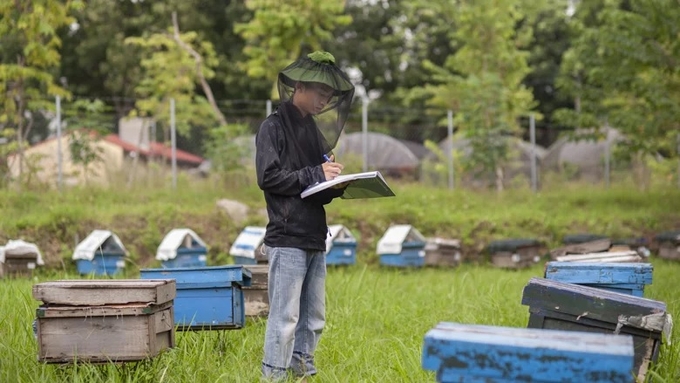
Students from the Center for Bee Research and Tropical Beekeeping at the Faculty of Agriculture regularly inspect the bee colonies on a daily basis. Picture: Mai Nguyen Anh/The World Bank.
Hanoi University of Science and Technology and Vietnam Academy of Agriculture are the country’s two largest public universities participating in the project. At the Academy of Agriculture, teachers and students always try to find solutions to the most pressing problems in the agricultural sector, which is considered the backbone of the economy, through teaching and research.
One of the priorities of the academy in recent years has been research into high-quality agricultural products that are resistant to climate change. One of these products is honey.
Strengthening the position of the bee industry
On average, Vietnam exports about 54,000 tons of honey every year. However, Vietnamese honey is mainly used in industrial processing. Even in the domestic market, consumers prefer imported honey products.
According to experts, the quality of Vietnamese honey needs to be improved. One of the main reasons is that some farmers often harvest honey too early, improperly and with many impurities, focusing on quantity rather than quality. The bee industry also needs to improve quality to diversify export markets.
associate Dr. Pham Hong Thai, Director of the Center for Bee Research and Tropical Beekeeping, Faculty of Agronomy, Agricultural College, always worries about how the quality of Vietnamese honey can be recognized worldwide.
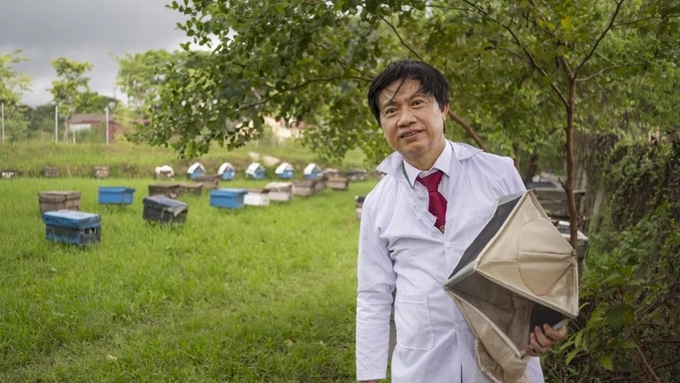
associate Dr. Pham Hong Thai, Director of the Center for Bee Research and Tropical Beekeeping. Picture: Mai Nguyen Anh/The World Bank.
Recently, Mr. Thai and his colleagues have managed to test the method of beekeeping in the next barrel to increase the purity of honey. This method helps to increase the quality of honey, since honey does not contain pollen and larvae and has a low water content. This technique was passed down from the center to farmers in some provinces such as Son La and Nghe An. It is estimated that keeping bees in this box can help farmers sell honey at twice the price.
Not only that, Mr. Thai’s center is also testing the use of technology in beekeeping and honey quality monitoring. The center is working with a number of companies in Hanoi and Dak Lak to put this new technology model into practice.
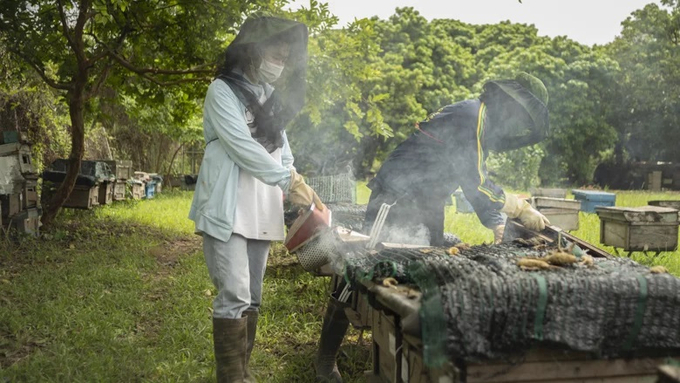
The Center for Bee Research and Tropical Beekeeping successfully tested beekeeping technology in a thistle to improve honey quality. Picture: Mai Nguyen Anh/The World Bank.
The system includes sensors that monitor the temperature, humidity or honey production of the bees. The application of blockchain technology will help merchants and consumers access product information more clearly and transparently through smartphone applications. This also helps farmers or companies involved in the supply chain to offer higher prices when both the cultivation process and the quality of the honey are proven.
In the coming period, through the SAHEP project, Mr. Thai and the Faculty of Agronomy students will have access to better equipment to enable teaching, experimentation and research with bees, thereby further helping Vietnam’s bee industry to become more sustainable develop and better understand the needs of the market.
“When studying temperature and humidity without equipment, it will be very difficult to draw any precise conclusions about the pathogen. Thanks to these devices, entomology students can see and do. For example, a company can request a quality analysis, track me how much sugar this honey has? Once the students have graduated, companies will also be more confident in shaking hands with the university,” said Mr. Thai.
Replicating the benefits of microalgae
Another area of research with great potential is microalgae, small organisms that can bring enormous health value.
Microalgae are widely used in the production of functional foods, cosmetics, animal feed and biological fertilizers. Some strains of microalgae can contain up to 70% protein and also serve as a source of omega-3 fatty acids. Microalgae are also able to capture CO2 from the atmosphere, helping to mitigate the harmful effects of climate change.
At the Research Institute of Microalgae and Cosmeceuticals, Faculty of Biotechnology, Assoc. Dr. Nguyen Duc Bach and his colleagues store the country’s best strains of microalgae for teaching, research, breeding and practical application.
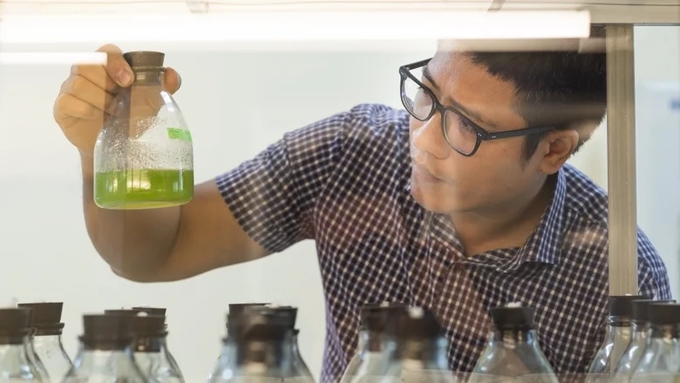
At the Faculty of Biotechnology, Assoc. Dr. Nguyen Duc Bach plays an important role in the research and application of microalgae in practice. Picture: Mai Nguyen Anh/The World Bank.
Algae are one of the indispensable food for aquatic larvae in the early stages. Vietnam is one of the strong exporters of aquatic products, so the task of increasing algal biomass is extremely necessary. center of the Assoc. DR. Bach is currently supplying microalgae seed to small farms across the country.
2020 PSG. DR. Bach also led a SAHEP-funded study to provide solutions to help Vietnam expand production of Spirulina, a green microalgae rich in proteins, vitamins and nutrients. Research shows that spirulina production does not meet domestic demand, so consumers often have to buy imported products.
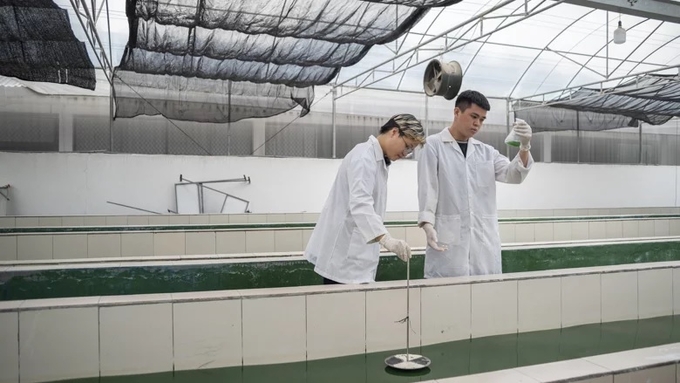
Students from the Institute for Microalgae Research and Cosmetology examine the algal biomass that has grown in a canal basin. Picture: Mai Nguyen Anh/The World Bank.
As part of a sub-project of SAHEP, Mr. Bach and his colleagues also conducted a research project on the synthesis of antioxidant products from three types of microalgae. Research results have led to hard capsules with antioxidant properties that help slow down the aging process in the eyes and improve vision. The Academy for Agriculture founded a spin-off company to commercialize the product, which has been certified by the Ministry of Health.
“The research product initially generated revenue that may be small in the short term, but it is a source of encouragement for us to continue research and development, a basis to contribute to the Academy’s autonomy,” said Bach.
In 2015, the Agricultural Academy was one of the universities granted by the government in the pilot category of autonomy. This means that the school has the right to make more needs-based decisions about finances, staffing and curricula. While this task remains challenging, the SAHEP project has created the necessary leverage to enhance the Academy’s capacity for greater autonomy.
For PGS. Dr. Thai, Autonomy also encourages students and faculty to be more creative. According to Mr. Thai, “University autonomy is the trend of the times and the world. As a result, the flow of money into education will be higher and the intelligence of education will also be more productive.”

